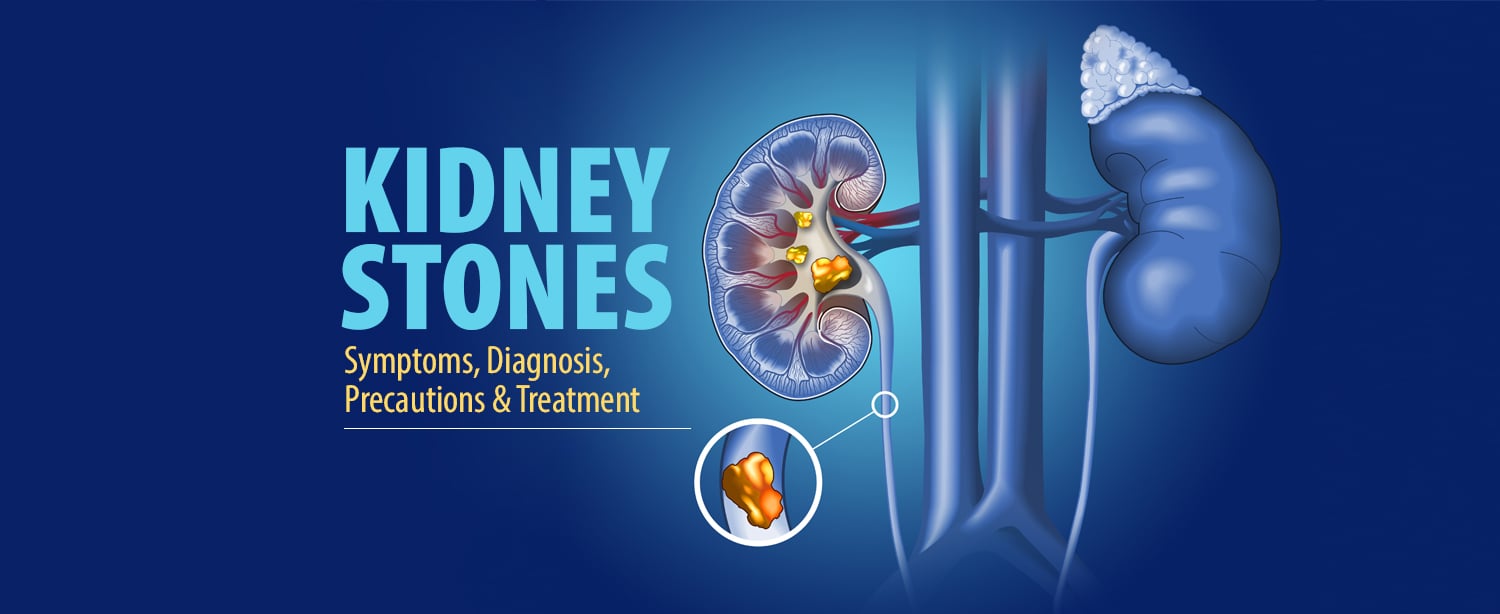Statistics suggest that over 12% of the total population in India suffers from kidney stones. A kidney stone is a solid, pebble-like piece of material that can form in one or both of your kidneys when high levels of certain minerals accumulate in your urine. They are one of the most painful and common urinary tract problems. These stones are formed by the buildup of minerals and salts in the kidneys, which can cause intense pain when they pass through the ureter and bladder.
Causes of Kidney Stones
While there is no exact cause behind kidney stones, in majority of the cases, these are formed due to the high concentration of minerals in the urine. Here are some of the most common causes behind kidney stones:
- Dehydration
When your body doesn’t get enough water, it can lead to the formation of kidney stones. - Diet
Eating a diet high in salt, sugar, and animal protein can increase your risk of developing kidney stones. - Genetics
If someone in your family has had kidney stones, you are more likely to develop them too. - Medical Conditions
Certain medical conditions such as gout, hyperparathyroidism, and Crohn’s disease can increase your risk of developing kidney stones.
Symptoms of Kidney Stones
The symptoms of kidney stones can vary depending on the size and location of the stone. Some of the most common symptoms include:
- Severe pain in the back, side, or groin.
- Painful urination.
- Difficulty passing urine
- A feeling of intense need to urinate.
- Urine that is dark or red due to blood.
- Nausea and vomiting.
If you experience any of these symptoms, it is important to see a doctor as soon as possible.
Diagnosis of Kidney Stones
If your doctor suspects that you have kidney stones, they will likely order a series of tests to confirm the diagnosis. These may include:
- Urine test
This can help identify any infections or abnormalities in the urine. - Blood test
This can help determine if there is an infection or other medical condition present. - X-ray
This can help identify the size and location of the kidney stone. - CT scan
This is a more detailed imaging test that can help identify the size and location of the kidney stone more accurately.
Precautions for Kidney Stones
If you have a history of kidney stones or are at risk for developing them, there are some precautions you can take to reduce your risk. With the right foods, plenty of water, and proper medication, you can lower your chances of getting them. These include:
- Drinking plenty of water
This can help flush out minerals and salts that can lead to the formation of kidney stones. - Eating a healthy diet
This means limiting your intake of salt, sugar, and animal protein, and increasing your intake of fruits, vegetables, and whole grains. - Avoiding certain medications
Some medications such as diuretics and antacids can increase your risk of developing kidney stones. - Managing medical conditions
If you have a medical condition that increases your risk of developing kidney stones, such as gout or hyperparathyroidism, it is important to manage it properly.
Treatment for Kidney Stones
If you are diagnosed with kidney stones, there are several treatment options available which include pain medication, Extracorporeal Shock Wave Lithotripsy (ESWL) or ureteroscopy – a minimally invasive procedure. Consult a urologist to understand your treatment options better.
Kidney Stone treatment at Kokilaben Dhirubhai Ambani Hospital, Mumbai
Troubled with recurrent kidney stones? Our Department of Urology is equipped with the latest ESWL (Lithotripsy) machine that is used to treat kidney stones. This is a non-invasive procedure that uses shock waves to break up the kidney stone into smaller pieces that can be passed more easily. Our state-of-the-art urology unit also offers minimally invasive, scarless options for safe removal of kidney stones. Consult our team for the right advice to help manage your kidney stones. Please find below the website link for further details: https://www.kokilabenhospital.com/departments/clinicaldepartments/urology.html


